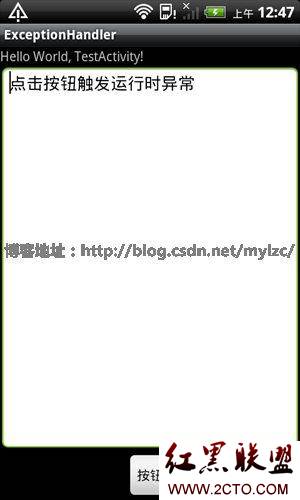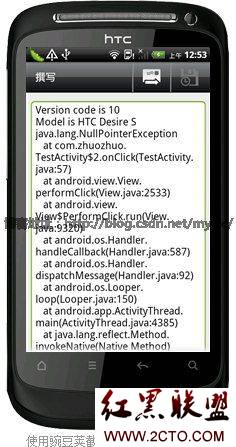转载博客:http://blog.csdn.net/i_lovefish/article/details/17719081
以下为异常捕捉处理代码:
import java.io.BufferedReader; import java.io.File; import java.io.FileInputStream; import java.io.FileNotFoundException; import java.io.FileOutputStream; import java.io.IOException; import java.io.InputStreamReader; import java.io.PrintWriter; import java.io.StringWriter; import java.io.Writer; import java.lang.Thread.UncaughtExceptionHandler; import java.lang.reflect.Field; import java.text.DateFormat; import java.text.SimpleDateFormat; import java.util.Date; import java.util.HashMap; import java.util.Map; import android.content.Context; import android.content.pm.PackageInfo; import android.content.pm.PackageManager; import android.content.pm.PackageManager.NameNotFoundException; import android.os.Build; import android.os.Environment; import android.os.Looper; import android.util.Log; import android.widget.Toast; /** * UncaughtException处理类,当程序发生Uncaught异常的时候,有该类来接管程序,并记录发送错误报告. * * 需要在Application中注册,为了要在程序启动器就监控整个程序。 */ public class CrashHandler implements UncaughtExceptionHandler { public static final String TAG = "CrashHandler"; //系统默认的UncaughtException处理类 private Thread.UncaughtExceptionHandler mDefaultHandler; //CrashHandler实例 private static CrashHandler instance; //程序的Context对象 private Context mContext; //用来存储设备信息和异常信息 private Map<String, String> infos = new HashMap<String, String>(); //用于格式化日期,作为日志文件名的一部分 private DateFormat formatter = new SimpleDateFormat("yyyy-MM-dd-HH-mm-ss"); /** 保证只有一个CrashHandler实例 */ private CrashHandler() {} /** 获取CrashHandler实例 ,单例模式 */ public static CrashHandler getInstance() { if(instance == null) instance = new CrashHandler(); return instance; } /** * 初始化 */ public void init(Context context) { mContext = context; //获取系统默认的UncaughtException处理器 mDefaultHandler = Thread.getDefaultUncaughtExceptionHandler(); //设置该CrashHandler为程序的默认处理器 Thread.setDefaultUncaughtExceptionHandler(this); } /** * 当UncaughtException发生时会转入该函数来处理 */ @Override public void uncaughtException(Thread thread, Throwable ex) { if (!handleException(ex) && mDefaultHandler != null) { //如果用户没有处理则让系统默认的异常处理器来处理 mDefaultHandler.uncaughtException(thread, ex); } else { try { Thread.sleep(3000); } catch (InterruptedException e) { Log.e(TAG, "error : ", e); } //退出程序 android.os.Process.killProcess(android.os.Process.myPid()); System.exit(1); } } /** * 自定义错误处理,收集错误信息 发送错误报告等操作均在此完成. * * @param ex * @return true:如果处理了该异常信息;否则返回false. */ private boolean handleException(Throwable ex) { if (ex == null) { return false; } //收集设备参数信息 collectDeviceInfo(mContext); //使用Toast来显示异常信息 new Thread() { @Override public void run() { Looper.prepare(); Toast.makeText(mContext, "很抱歉,程序出现异常,即将退出.", Toast.LENGTH_SHORT).show(); Looper.loop(); } }.start(); //保存日志文件 saveCatchInfo2File(ex); return true; } /** * 收集设备参数信息 * @param ctx */ public void collectDeviceInfo(Context ctx) { try { PackageManager pm = ctx.getPackageManager(); PackageInfo pi = pm.getPackageInfo(ctx.getPackageName(), PackageManager.GET_ACTIVITIES); if (pi != null) { String versionName = pi.versionName == null ? "null" : pi.versionName; String versionCode = pi.versionCode + ""; infos.put("versionName", versionName); infos.put("versionCode", versionCode); } } catch (NameNotFoundException e) { Log.e(TAG, "an error occured when collect package info", e); } Field[] fields = Build.class.getDeclaredFields(); for (Field field : fields) { try { field.setAccessible(true); infos.put(field.getName(), field.get(null).toString()); Log.d(TAG, field.getName() + " : " + field.get(null)); } catch (Exception e) { Log.e(TAG, "an error occured when collect crash info", e); } } } /** * 保存错误信息到文件中 * * @param ex * @return 返回文件名称,便于将文件传送到服务器 */ private String saveCatchInfo2File(Throwable ex) { StringBuffer sb = new StringBuffer(); for (Map.Entry<String, String> entry : infos.entrySet()) { String key = entry.getKey(); String value = entry.getValue(); sb.append(key + "=" + value + " "); } Writer writer = new StringWriter(); PrintWriter printWriter = new PrintWriter(writer); ex.printStackTrace(printWriter); Throwable cause = ex.getCause(); while (cause != null) { cause.printStackTrace(printWriter); cause = cause.getCause(); } printWriter.close(); String result = writer.toString(); sb.append(result); try { long timestamp = System.currentTimeMillis(); String time = formatter.format(new Date()); String fileName = "crash-" + time + "-" + timestamp + ".log"; if (Environment.getExternalStorageState().equals(Environment.MEDIA_MOUNTED)) { String path = "/mnt/sdcard/crash/"; File dir = new File(path); if (!dir.exists()) { dir.mkdirs(); } FileOutputStream fos = new FileOutputStream(path + fileName); fos.write(sb.toString().getBytes()); //发送给开发人员 sendCrashLog2PM(path+fileName); fos.close(); } return fileName; } catch (Exception e) { Log.e(TAG, "an error occured while writing file...", e); } return null; } /** * 将捕获的导致崩溃的错误信息发送给开发人员 * * 目前只将log日志保存在sdcard 和输出到LogCat中,并未发送给后台。 */ private void sendCrashLog2PM(String fileName){ if(!new File(fileName).exists()){ Toast.makeText(mContext, "日志文件不存在!", Toast.LENGTH_SHORT).show(); return; } FileInputStream fis = null; BufferedReader reader = null; String s = null; try { fis = new FileInputStream(fileName); reader = new BufferedReader(new InputStreamReader(fis, "GBK")); while(true){ s = reader.readLine(); if(s == null) break; //由于目前尚未确定以何种方式发送,所以先打出log日志。 Log.i("info", s.toString()); } } catch (FileNotFoundException e) { e.printStackTrace(); } catch (IOException e) { e.printStackTrace(); }finally{ // 关闭流 try { reader.close(); fis.close(); } catch (IOException e) { e.printStackTrace(); } } } }
针对异常的捕捉要进行全局监控整个项目,所以要将其在Application中注册(也就是初始化):
import android.app.Application; public class CrashApplication extends Application { @Override public void onCreate() { super.onCreate(); CrashHandler catchHandler = CrashHandler.getInstance(); catchHandler.init(getApplicationContext()); } }
现在模拟一个空指针异常:
import android.app.Activity; import android.os.Bundle; public class CatchExceptionLogActivity extends Activity { /** Called when the activity is first created. */ private String s; @Override public void onCreate(Bundle savedInstanceState) { super.onCreate(savedInstanceState); setContentView(R.layout.main); System.out.println(s.equals("hello")); // s没有进行赋值,所以会出现NullPointException异常 } }
别忘了在配置文件中对Application进行注册:
<?xml version="1.0" encoding="utf-8"?>
<manifest xmlns:android="http://schemas.android.com/apk/res/android"
package="com.forms.catchlog"
android:versionCode="1"
android:versionName="1.0" >
<uses-sdk android:minSdkVersion="8" />
<uses-permission android:name="android.permission.WRITE_EXTERNAL_STORAGE"/>
<application
android:icon="@drawable/ic_launcher"
android:label="@string/app_name"
<span style="color:#ff0000;">android:name=".CrashApplication"></span>
<activity
android:label="@string/app_name"
android:name=".CatchExceptionLogActivity" >
<intent-filter >
<action android:name="android.intent.action.MAIN" />
<category android:name="android.intent.category.LAUNCHER" />
</intent-filter>
</activity>
</application>
</manifest>
添加异常捕获之后的日志提示
由于Android设备各异,第三方定制的Android系统也非常多,我们不可能对所有的设备场景都进行测试,因而开发一款完全无bug的应用几乎是不可能的任务,那么当应用在用户的设备上Force Close时,我们是不是可以捕获这个错误,记录用户的设备信息,然后让用户选择是否反馈这些堆栈信息,通过这种bug反馈方式,我们可以有针对性地对bug进行修复。
当我们的的应用由于运行时异常导致Force Close的时候,可以设置主线程的UncaughtExceptionHandler,实现捕获运行时异常的堆栈信息。同时用户可以把堆栈信息通过发送邮件的方式反馈给我们。下面是实现的代码:
代码下载请按此
例子:点击按钮后,会触发一个NullPointerException的运行时异常,这个例子实现了捕获运行时异常,发送邮件反馈设备和堆栈信息的功能。
界面1(触发运行时异常)

界面2(发送堆栈信息)

TestActivity.java
package com.zhuozhuo; import java.io.PrintWriter; import java.io.StringWriter; import java.lang.Thread.UncaughtExceptionHandler; import android.app.Activity; import android.content.Intent; import android.net.Uri; import android.os.Build; import android.os.Bundle; import android.util.Log; import android.view.View; import android.view.View.OnClickListener; import android.widget.EditText; import android.widget.TextView; public class TestActivity extends Activity { /** Called when the activity is first created. */ @Override public void onCreate(Bundle savedInstanceState) { super.onCreate(savedInstanceState); setContentView(R.layout.main); Thread.setDefaultUncaughtExceptionHandler(new UncaughtExceptionHandler() {//给主线程设置一个处理运行时异常的handler @Override public void uncaughtException(Thread thread, final Throwable ex) { StringWriter sw = new StringWriter(); PrintWriter pw = new PrintWriter(sw); ex.printStackTrace(pw); StringBuilder sb = new StringBuilder(); sb.append("Version code is "); sb.append(Build.VERSION.SDK_INT + " ");//设备的Android版本号 sb.append("Model is "); sb.append(Build.MODEL+" ");//设备型号 sb.append(sw.toString()); Intent sendIntent = new Intent(Intent.ACTION_SENDTO); sendIntent.setData(Uri.parse("mailto:csdn@csdn.com"));//发送邮件异常到csdn@csdn.com邮箱 sendIntent.putExtra(Intent.EXTRA_SUBJECT, "bug report");//邮件主题 sendIntent.putExtra(Intent.EXTRA_TEXT, sb.toString());//堆栈信息 startActivity(sendIntent); finish(); } }); findViewById(R.id.button).setOnClickListener(new OnClickListener() { @Override public void onClick(View v) { Integer a = null; a.toString();//触发nullpointer运行时错误 } }); } }
main.xml
<?xml version="1.0" encoding="utf-8"?> <LinearLayout xmlns:android="http://schemas.android.com/apk/res/android" android:orientation="vertical" android:layout_width="fill_parent" android:layout_height="fill_parent"> <TextView android:layout_width="fill_parent" android:layout_height="wrap_content" android:text="@string/hello" /> <EditText android:id="@+id/editText1" android:layout_width="match_parent" android:text="点击按钮触发运行时异常" android:layout_height="wrap_content" android:layout_weight="1" android:gravity="top"></EditText> <Button android:text="按钮" android:id="@+id/button" android:layout_width="wrap_content" android:layout_height="wrap_content" android:layout_gravity="center_horizontal"></Button> </LinearLayout>